Does FIFA 15 fix the series' legacy issues?
Much stays the same for EA Sports new outing, but on closer inspection much has changed.
It was one of those little moments in my personal gaming history that I don't think I'll ever forget. We'd been summoned to a classmate's house to witness the beginning of a new chapter in console technology: Sony's hip and edgy PlayStation. The classmate (let's call him Rob - after all, that was his name) was a rarity in our peer group - someone whose parents considered it entirely reasonable to spend around £300 on something which then, much more so than now, was considered little more than a toy. Rob was unpopular, in an awkward 11-year-old sort of way, but that night his living room would become the centre of our worlds.
The thing that's hardest to relate to now, I think, is how ignorant we were of the system's capabilities in our unenlightened, pre-internet age. We'd all been thumbing away quite happily on our Super Nintendos and Mega Drives for a good few years with little conception of how limited our two-dimensional exploits would one day seem. We'd seen adverts, but we were old enough to know that adverts lie. We were utterly unprepared for the game that, with an unfamiliar spin and whirr, was loading up in front of our eyes.
I think a lot of people will have similar stories about FIFA 97. It summed up everything that was new and exciting about what lay ahead in gaming. The presentation - most memorably the quality of the audio commentary - easily exceeded our vague expectations and the third dimension, now fully realised, was a whole new world for us to explore.
18 years have passed since that day and that feeling of childlike wonder seems little more than a relic of a bygone age. There is no fourth-dimension console, and as much as I try to stoke some sense of anticipation on the train down to my hands-on session with FIFA 15 - the first fully fledged eighth-generation release in the series - I assume that, unless we're strapped into Morpheus headsets immediately on arrival, I'll have little more than a handful of aesthetic improvements and some dev-speak nonsense about fully verticalised ball-to-player trajectornomics to take back to London with me.
"To me, football is the most emotive sport in the world." This is the opening pitch from Nick Channon, the game's lead producer, so my heart sinks. The focus of his presentation - and presumably EA's marketing drive - is on the low-hanging fruit of improved crowd animations, chants, player facial expressions and, er, fully animated advertising hoardings. Next-gen processing power also means that the highlights load up a bit quicker and that, for the first time, the corner flag moves if you bump into it. My mind wanders. Did FIFA 97 really have an indoor football option? Surely I can't be remembering that right...
Hidden within the sound bites and slogans, however, is some pretty impressive tech. In particular, players' interaction with team-mates and opposition is now logged during the game, with animations contextually triggered in accordance to, say, a series of fouls or terrible misses. So if a player is hacked down in the opening minute, he'll react with relative equanimity, but if that same defender kicks him a few times more, it will trigger full-on handbags at dawn.
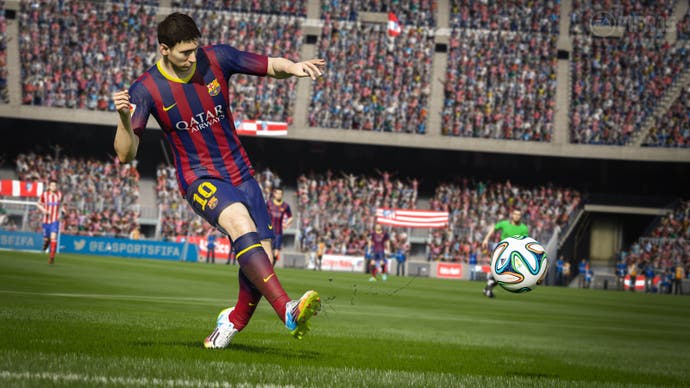
Similarly, an open-goal miss in the first minute will be received much more calmly by team-mates than one in the last. The intention is to make the players feel more like real people than player-controlled robots and, while the logical progression of this might throw up some problems (would you want to not be able to pass to certain players if they'd fallen out with team-mates during the match?), it's a sign of how much further the series can go in terms of realism and immersion.
But realism and immersion don't always mean more fun, and that's been my biggest problem with the last few years of FIFA. While huge strides forward have been made in terms of the infrastructure around the game (online play, Ultimate Team, etc), the gameplay on-pitch has taken a step back for every step forward. At various times headers have been overpowered, defending has been too easy, or too difficult. Certain kinds of shots have been too effective. In particular, the game has felt like it's getting slower with each new animation and skill control added and, while it's no easy feat balancing such a sophisticated engine, it's not really felt like it's becoming a better football game with each iteration.
My main concern before actually playing the game, then, is that FIFA 15 will carry on this trend - sandwiching in more and more bells and whistles at the cost of speed and responsiveness. As the talk continues about "unrivalled intelligence" (AI sides are now more likely to pump the ball into the box if losing towards the end of the game, or will time-waste and keep possession if trying to protect a lead) and "stutter steps" (the players' legs will correspond better to the ball's movement while dribbling) it feels like my fears are being confirmed. New FIFA: just like the old FIFA, but with better grass.
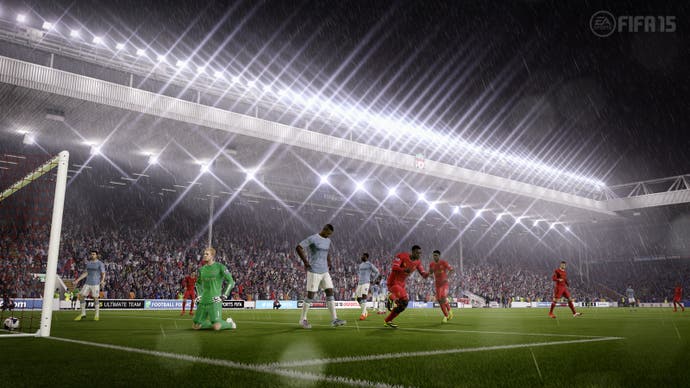
But then I actually play it. Channon has paid lip service to "agility" and "responsiveness" but these possibly less marketable tweaks to gameplay certainly don't seem like something EA is particularly proud of - and besides, EA says something along these lines about every new game. But thanks to these small refinements, within three passes of kick-off, I know this year will be different. The simplest way to describe it is this: they've fixed it. They've fixed FIFA. Out with the treacly turning circles and in with the sort of sharp, precise controls that represent everything that's been great about the best football games.
Not only is the pace quicker, but the variety of goals I score and matches I play is greater than anything I can remember experiencing in similar sessions. In a few hours of play against similarly unskilled games journalists, I score a 30-yard volley and set another up with a Wilshere vs Norwich-esque bit of tiki taka. There is a thrilling 0-0 draw with an injury-time clearance off the line, a crazy 6-2 win in which Suarez scores a perfect hat-trick. Tallying this up against years of having to relearn every new football game - be that FIFA or PES - before I can get too much pleasure out of them, everything feels right.
Suddenly I'm able to look at all those seemingly frivolous aesthetic tweaks afresh. Sure, you might not notice each individual change, but I can see that the crowd, the player reactions, the lighting, the grass (I could write an essay about the grass), the leaner body shapes, the shirt pulling, the throw-ins, the glancing headers, the footprints, the muddy shirts, the moving hair, the fully animated You'll Never Walk Alone - every single one of these improvements and every single one I haven't mentioned has combined to deliver, finally, that leap forward we've all been waiting for.
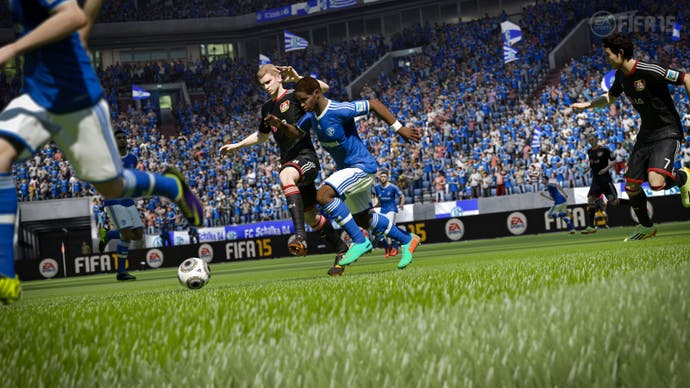
I catch up with Channon after the session and he provides a few insights into how the game has got to this point. Although it is described as being only 50 or 60 per cent finished code, it's clear something fundamental has been nailed to the wall - a standard from which to launch another generation's worth of FIFAs. Working on ageing tech had involved far more compromises, while next-gen FIFA 14 was a struggle as the hardware evolved alongside EA's plans. Now the team can plan two to three years ahead, and with all the power of the PS4 and Xbox One to play with, it's clear they feel like the sky's the limit.
So I leave the event not quite as excited as I had been all those years ago, perhaps, but certainly already looking forward to being able to play the game in my own living room. Perhaps get some snacks in, invite some friends round, make an evening of it. Maybe even give Rob a call. Who knows - in 18 years time, we might all still be talking about it.
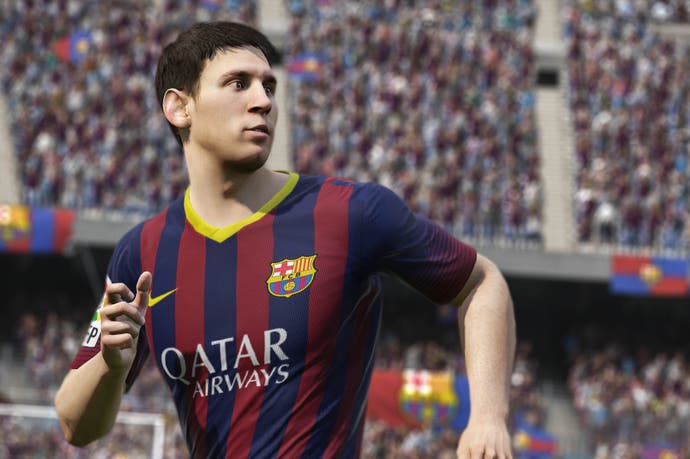




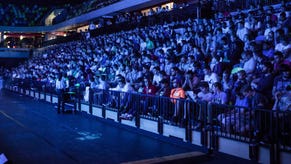


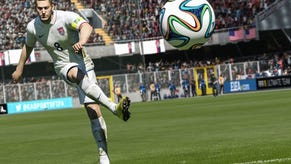


.png?width=291&height=164&fit=crop&quality=80&format=jpg&auto=webp)




.jpg?width=291&height=164&fit=crop&quality=80&format=jpg&auto=webp)
